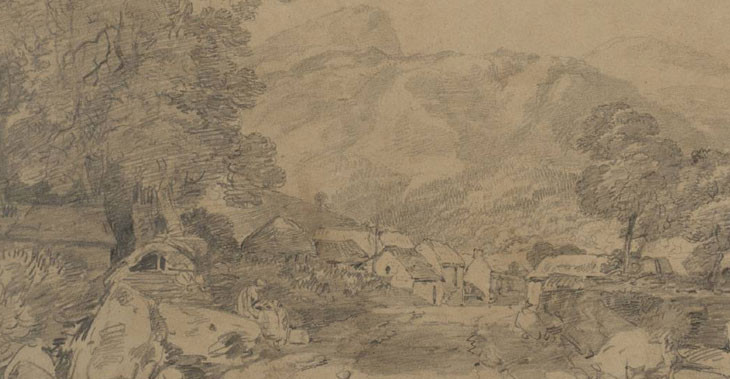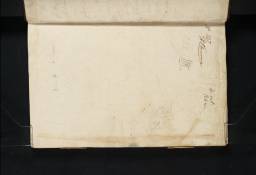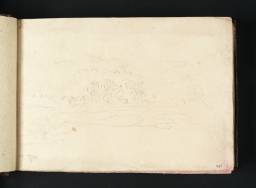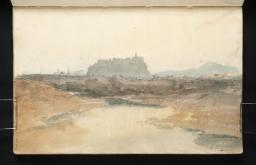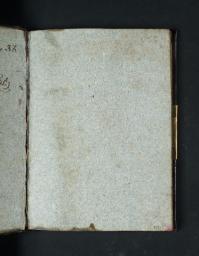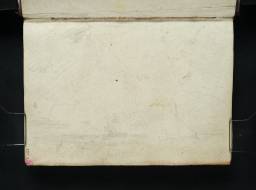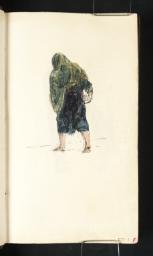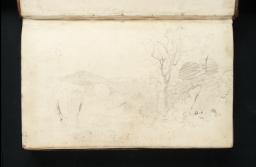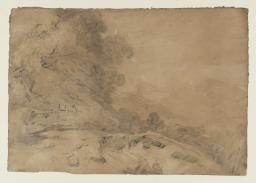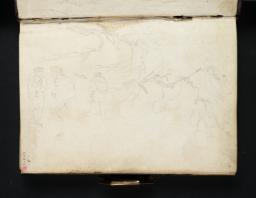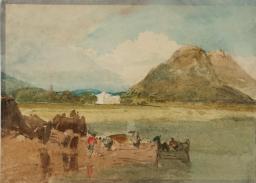From the entry
If the 1797 North of England and 1798 and 1799 Welsh itineraries seemed to follow each other in a logical sequence, taking Turner steadily farther from London and into progressively grander scenery, his visit to the Scottish Highlands in 1801 forms the climax of that progression, and leads equally naturally into the tour to France and the Alps of 1802. This later trip was, however, dependent on political circumstances that were far from being in his control. In 1801 he had a commission that took him as far as the Lake District and Carlisle, and a further request for a view of Inveraray Castle from the Duke of Argyll which must have must have provided him with the impulse to plan a journey penetrating far into Scotland. By this time Turner was consciously on the lookout for subject matter that would impress in the context of the Royal Academy’s exhibitions, so the decision will have recommended itself as obvious enough. He gave himself time to explore Edinburgh thoroughly first; then set off on a carefully considered route ...
Scotch Lakes sketchbook 1801
D02927–D02984, D02992–D03276, D41240–D41249, D41411
Turner Bequest LVI 1–185
D02927–D02984, D02992–D03276, D41240–D41249, D41411
Turner Bequest LVI 1–185
The ‘Scottish Pencils’ 1801
D03380–D03421, D03423–D03439, D04894, D40261, D41441, D41442
Turner Bequest LVIII 1–42, 44–60, LXXX A
D03380–D03421, D03423–D03439, D04894, D40261, D41441, D41442
Turner Bequest LVIII 1–42, 44–60, LXXX A
D03632–D03638, D03640, D03641, D04179, D08281
Turner Bequest LX A, B, C, D, E, F, G, I, J, LXX b, CXXI Y
Turner Bequest LX A, B, C, D, E, F, G, I, J, LXX b, CXXI Y
If the 1797 North of England and 1798 and 1799 Welsh itineraries seemed to follow each other in a logical sequence, taking Turner steadily farther from London and into progressively grander scenery, his visit to the Scottish Highlands in 1801 forms the climax of that progression, and leads equally naturally into the tour to France and the Alps of 1802. This later trip was, however, dependent on political circumstances that were far from being in his control. In 1801 he had a commission that took him as far as the Lake District and Carlisle, and a further request for a view of Inveraray Castle from the Duke of Argyll which must have must have provided him with the impulse to plan a journey penetrating far into Scotland.
By this time Turner was consciously on the lookout for subject matter that would impress in the context of the Royal Academy’s exhibitions, so the decision will have recommended itself as obvious enough. He gave himself time to explore Edinburgh thoroughly first; then set off on a carefully considered route, no doubt benefiting from the advice of his fellow Academician the artist Joseph Farington (1747–1821), who had made a topographical tour of part of Scotland in 1780 and returned there in the same year as Turner.
In addition to the pocketable sketchbooks that were becoming his usual travelling companions, Turner made a series of larger drawings in pencil or black chalk on a warm greyish-brown ground (the so-called ‘Scottish Pencils’; Turner Bequest LVIII) that perform a different role form that of his usual notes. It was to become a common practice for him to compose a parallel record of his tours in tonal form, rather than simply by means of outline on white paper: in 1817 his tour of the Rhine resulted in a set of fifty coloured views on sheets washed with grey,1 while in Italy in 1819 he gave over the whole Tivoli sketchbook (Tate; Turner Bequest CLXXXIII) to studies in pencil and scraping-out on a grey ground. The habit is clearly not explicable simply as a way of avoiding the glare of sunlight reflected off white paper; rather, it indicates his continuing sense that his subject matter was always potentially, at least, a painting in embryo.
The substantial Smaller Fonthill sketchbook (Tate; Turner Bequest XLVIII) was also used in the North of England and Scotland in 1801, but as it had already been in use for some years it will be found in the ‘Architectural and Other Subjects c.1797–1807’ section of this catalogue.
How to cite
Andrew Wilton, ‘The 1801 Tour of Scotland and Related Works 1801–10’, November 2013, in David Blayney Brown (ed.), J.M.W. Turner: Sketchbooks, Drawings and Watercolours, Tate Research Publication, April 2016, https://www

